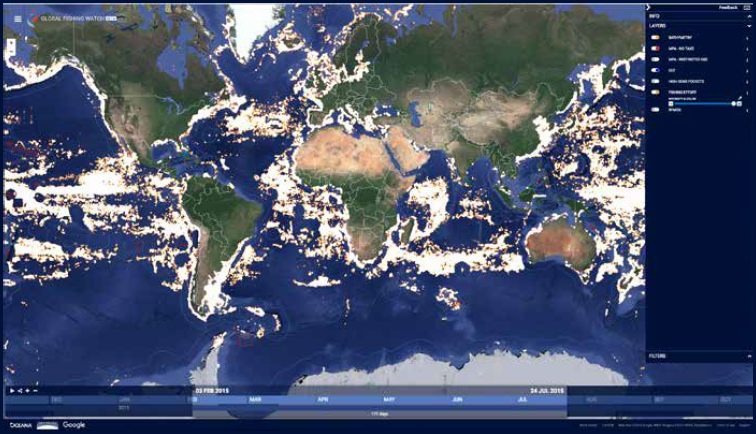Oceana and Bloomberg Philanthropies: Working Together for Vibrant Oceans

By Andy Sharpless, Oceana CEO
In January 2014, Bloomberg Philanthropies launched its Vibrant Oceans Initiative, a five-year, $53 million commitment to help restore fish populations around the world. The grant, which supports work by Oceana, Rare and Encourage Capital, marked the largest philanthropic commitment to international fisheries reform management to date.
In making this commitment, Bloomberg Philanthropies recognized a need for urgent action to save the world’s oceans. This week, leaders from around the globe have come to the 2016 Our Ocean conference in Washington, D.C. with the same goal: to address the long-term health of the world’s oceans through concrete action. It is an encouraging moment and an important step toward responsible stewardship of some of our most precious natural resources.
I am pleased to write that on September 15, with Bloomberg Philanthropies’ support, Oceana officially launched Global Fishing Watch at the Our Ocean conference. Global Fishing Watch is a free online platform created by Oceana, SkyTruth and Google that allows users to view information about worldwide fishing activity by tracking more than 35,000 commercial fishing vessels. From a café in Madrid, a citizen can watch the Spanish fleet, the third largest in the European Union, in action from the Mediterranean Sea to the Pacific Ocean. A government administrator in Chile can keep tabs on a suspicious vessel rendezvous occurring just outside of the nation’s Exclusive Economic Zone. A lawyer in the Philippines can observe activity in Tañon Strait and record visual evidence that will help the enforcement of protections in that vital habitat. In the hands of citizens and governments around the world, Global Fishing Watch can be utilized locally to have impact globally.
This announcement is only the most recent example of what Oceana and Bloomberg Philanthropies have been able to achieve together. The Vibrant Oceans Initiative focuses on three priority interventions: establishing science-based management of industrial fishing fleets, inspiring adoption of sustainable small-scale fishery management practices, and creating market incentives for regional governments to take advantage of products from local fishermen. Healthy oceans, managed with science-based policies, will not only protect species like sharks and whales and sea turtles; our oceans can help provide a healthy seafood meal for more than a billion people a day forever. In addition to Global Fishing Watch, our partnership has focused on three countries: Brazil, Chile and the Philippines. And with the support of Bloomberg Philanthropies, we have won key victories for the oceans in these countries.
Brazil has presented the most difficult national political situation of any of the countries where Oceana works. But since we began work there – and with the help of Bloomberg Philanthropies – our team of Brazilian scientists and ocean advocates has been able to accomplish a great deal. Together with our allies, we’ve restarted basic data gathering on fisheries catches, a practice entirely abandoned since 2008. We helped establish the first regional Fishery Management Councils – and won the first-ever seats on them for NGOs and artisanal fisher representatives. Earlier this month, at a meeting brokered by Oceana, experts delivered an open letter to the Brazilian Minister of Agriculture, Livestock and Supply and the Minister of the Environment outlining recommendations for improved fisheries research and management.
In Chile, Oceana won a victory wherein the Chilean government adopted a management plan for one of the country’s most overfished fisheries, the common hake. The new plan, which was required by a 2013 law, was the first ever adopted by the Chilean government. Our campaigners also won a significant victory against the salmon farming industry. Salmon pens with high density – large numbers of fish in a small space – have been subject to the rapid spread of diseases and parasites. After campaigning by Oceana, the Chilean government recently announced a density reduction plan that will require salmon farming areas with poor sanitary measures and a high prevalence of diseases to reduce their density by half. It is estimated that with effective implementation of this plan, total density will be reduced by one-third by the end of 2016, improving sanitary conditions and reducing the risk of disease outbreaks that threaten wild ecosystems.
We’ve also won concrete policy victories in the Philippines. Oceana helped win amendments to the 1998 Philippine Fisheries Code that will undermine illegal fishing activity and help rebuild fisheries. The amended code increases penalties for violating fisheries laws, such as illegally fishing within 15-kilometer municipal waters reserved for smaller-scale fishermen, damaging important habitat like seagrasses and mangroves and using unlicensed fishing gear. We’ve also made strides in protecting important habitats in the Philippines. Oceana successfully convened the 350-member Tañon Strait Protected Area Management Board (PAMB) for the first time since its founding in 1998. Thanks in part to years of petitioning by Oceana’s Gloria Estenzo Ramos, the Philippines’ Supreme Court ruled oil and gas exploration unconstitutional in the Tañon Strait. And together with the government and a top university, in 2016 we conducted the first serious expedition to study and protect the Benham Rise, part of a vast ocean territory recently granted to the Philippines under the Law of the Sea.
Oceana’s collaboration with Bloomberg Philanthropies as part of the Vibrant Oceans Initiative is delivering results around the world. We are winning policy victories for the ocean and, with the launch of Global Fishing Watch, empowering people everywhere to join in the fight for healthier seas. With this record of success, we are optimistic that our continued partnership will bring additional, exciting victories in the years to come.